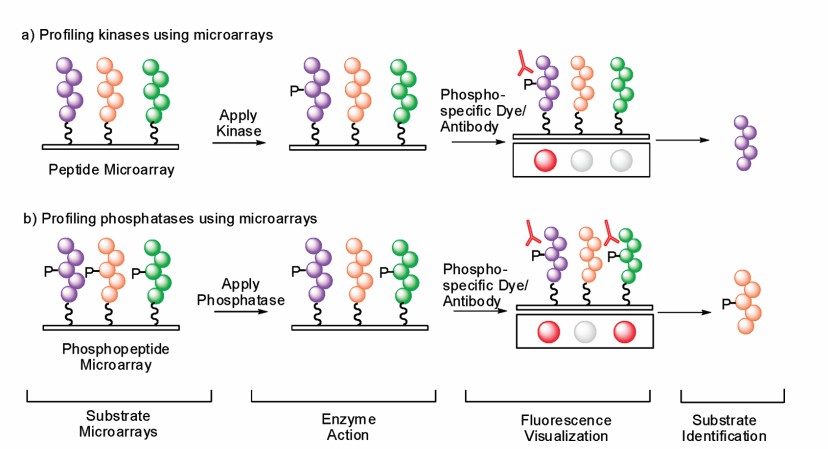Enzyme profiling is a scientific technique that plays an essential role in modern biology. It is used to identify and quantify the types and amounts of enzymes present in a biological sample. This process is crucial as it enhances our understanding of various biological processes and diseases. Enzymes are responsible for catalyzing biological reactions, and their presence, absence, and quantity can provide significant insights into the state of a biological system.
 Substrate microarrays for high-throughput enzyme screening(M Uttamchandani, et al., 2009)
Substrate microarrays for high-throughput enzyme screening(M Uttamchandani, et al., 2009)
Service Process
Our service process involves four main steps:
- Consultation: In this phase, you can discuss your specific needs and requirements with our team of experts. We're here to understand your objectives and guide you accordingly.
- Sample Submission: Once the consultation is done, you'll need to send us your biological sample. We handle each sample with utmost care to ensure the integrity of the enzymes.
- Analysis: This is the core phase where we conduct the enzyme profiling according to the outlined technology roadmap. Our team of experienced scientists ensures the process is done accurately and meticulously.
- Report: After the analysis, we send you a detailed report of our findings. This report includes the identification and quantification of the enzymes, along with a comprehensive interpretation of the results.
We understand that enzyme profiling is a complex process. Therefore, feel free to reach out with any questions or to discuss your needs. Our team is more than ready to assist you.
Applications
Enzyme profiling has a myriad of applications in various areas of research and medicine. It is widely used in drug development to understand how potential drugs interact with enzymes. Similarly, it can be employed in disease diagnosis as changes in enzyme levels often indicate the presence of certain diseases. Moreover, enzyme profiling is vital for understanding biological processes at a molecular level, offering insights into how life functions.
| Application |
Description |
| Drug Discovery |
Identify and characterize enzymes involved in drug metabolism, aiding in the development of pharmaceuticals and understanding potential drug interactions. |
| Disease Diagnosis |
Detect and quantify changes in enzyme activity associated with specific diseases, providing diagnostic markers for various medical conditions. |
| Biotechnology |
Optimize enzyme performance in industrial processes, such as biofuel production, food processing, and textile manufacturing, to enhance efficiency and product quality. |
| Agriculture |
Improve crop yield and quality by understanding enzyme functions in plant metabolism, leading to the development of enhanced agricultural practices. |
| Environmental Monitoring |
Assess environmental health by monitoring enzyme activity as indicators of pollution levels, helping to identify and address environmental contaminants. |
| Metabolic Engineering |
Modify or engineer enzyme pathways to enhance the production of specific compounds, including biofuels, chemicals, and pharmaceuticals, in microbial or cellular systems. |
| Proteomics and Systems Biology |
Contribute to understanding cellular functions by profiling enzyme activities, aiding in the elucidation of complex biological processes and regulatory networks. |
| Clinical Research |
Investigate the role of enzymes in various physiological processes, contributing to the development of targeted therapies and personalized medicine approaches. |
FAQs
We have a comprehensive FAQ section where you can find answers to common questions about enzyme profiling. If you have more specific or detailed questions, don't hesitate to get in touch with us directly.
How long does the enzyme profiling process take?
The length of the process can vary depending on the complexity of the sample and the specific enzymes being profiled. On average, you can expect the process to take between 1-2 weeks.
Do I need to prepare my sample in any specific way before sending it for enzyme profiling?
It is recommended that you discuss sample preparation with our team during the consultation phase. We can provide guidance on how to best preserve your sample for enzyme profiling.
Can enzyme profiling be used to diagnose all types of diseases?
While enzyme profiling can provide valuable insights into many different diseases, it is not a universal diagnostic tool. The utility of enzyme profiling for disease diagnosis depends on whether the disease in question is known to cause changes in enzyme levels.
What sort of information does the final report include?
The final report includes a detailed breakdown of the enzymes identified in your sample, their quantities, and an interpretation of these results in relation to your specific objectives.
Is enzyme profiling safe?
Yes. The procedure is conducted in a controlled lab environment by trained professionals.
How accurate is enzyme profiling?
Enzyme profiling is a highly accurate method when conducted properly. Our team of experienced scientists ensures the accuracy of the results by following rigorous protocols and using state-of-the-art equipment.
Can I use enzyme profiling for personal health analysis?
Enzyme profiling is primarily a research tool and not generally used for personal health analysis. However, in some cases, medical professionals might use it to gather more information about a patient's health condition.
Is enzyme profiling only used for human samples?
No, enzyme profiling can be used on samples from a variety of organisms, not just humans. It's a versatile tool in research involving any biological system.
How is enzyme profiling different from genetic profiling?
While both methods are used to gather information about biological systems, they focus on different elements. Genetic profiling looks at an individual's DNA, while enzyme profiling focuses on the enzymes, which are proteins that catalyze various biological reactions.
Can the results of enzyme profiling change over time?
Yes, the results of enzyme profiling can change based on the state of the biological system at the time the sample was collected. Factors such as diet, stress, disease, and medication can all impact enzyme levels.

































 Substrate microarrays for high-throughput enzyme screening(M Uttamchandani, et al., 2009)
Substrate microarrays for high-throughput enzyme screening(M Uttamchandani, et al., 2009)